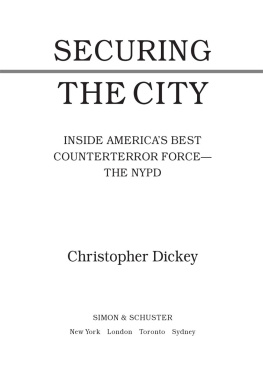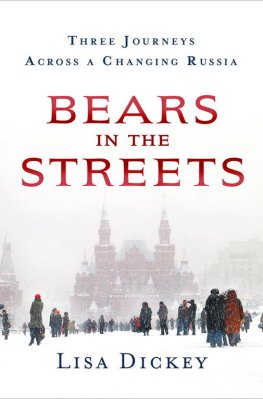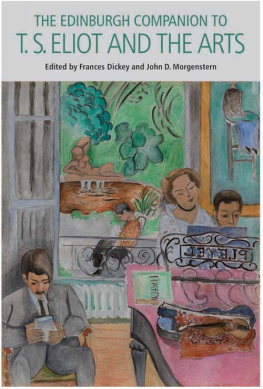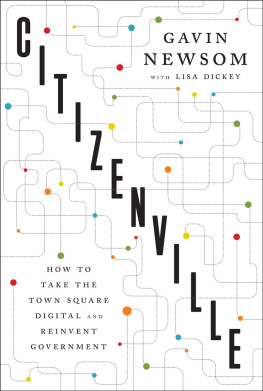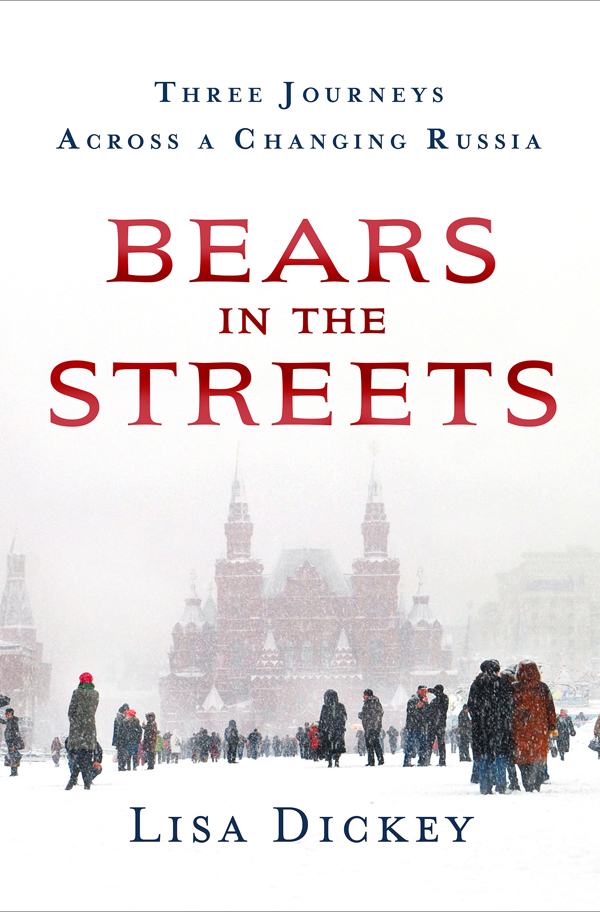Contents
Guide
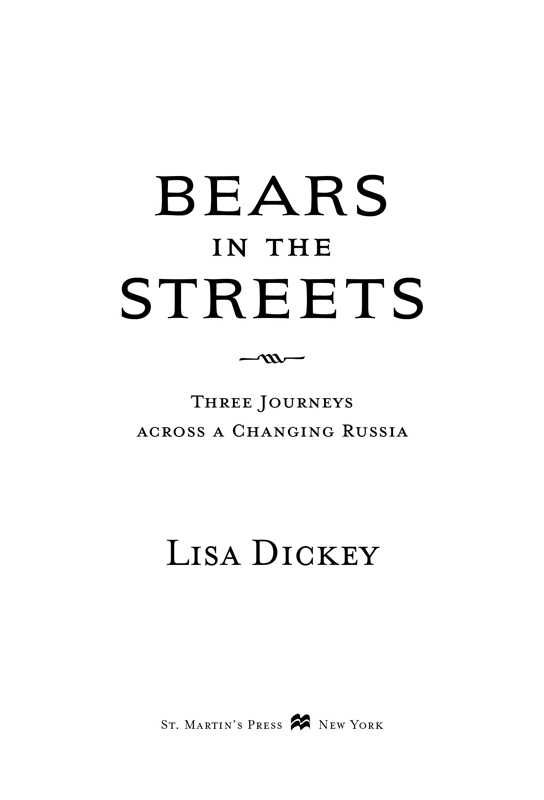
The author and publisher have provided this e-book to you for your personal use only. You may not make this e-book publicly available in any way. Copyright infringement is against the law. If you believe the copy of this e-book you are reading infringes on the authors copyright, please notify the publisher at: us.macmillanusa.com/piracy.
In the papers every day there were thousands of words about Russia. And it occurred to us that there were some things that nobody wrote about Russia, and they were the things that interested us most of all.
John Steinbeck, A Russian Journal , 1948
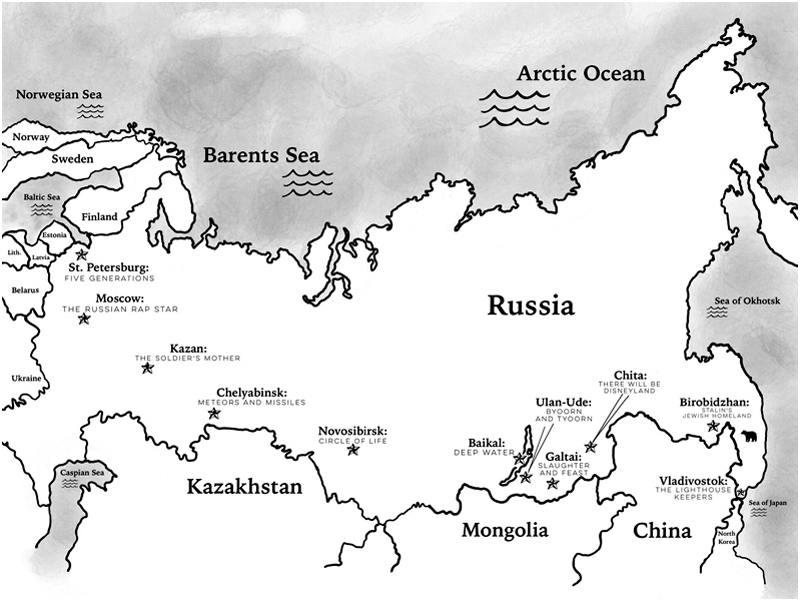
Im walking down Vladivostoks Admiral Fokin Street, a tidy, tree-lined pedestrian mall with a view of sparkling Sportivnaya Harbor in the distance. Its a brilliant late-summer day, the sun beaming down on shops and souvenir stands, the street packed with people. At this time of year, Vladivostok is a warm, inviting seaside city, the smell of salt air mingling with the aroma of freshly flipped blini and coffee wafting from cafs.
Strolling beside me are Valya and Katya, a couple of older Russian women wearing pedal-pusher pants and sensible shoes.
Hows your trip so far? Katya asks me.
Its my third day, I say, so theres not much to tell. Ive only just arrived in Vladivostok, the first stop of a planned three-month journey across Russia. Ill be traveling by train, dropping into 11 cities to visit people I interviewed first in 1995, then again in 2005, and now in 2015. Valya is one of the people I met 20 years ago, but her friend Katya, whos tagging along for our walk, is the one asking the questions today.
Im just happy to have gotten my Russian visa without any problems, I tell her, adding that I hope to be allowed to travel freely throughout the country over the coming months.
Of course you will, Katya says brusquely. Why wouldnt you? I tell her that with U.S.-Russian relations at their lowest point in years, Id recently read a few articles suggesting that Russian officials have been clamping down on unstructured travel.
Pfffft! she retorts, waving her hand. Thats just the American press. You cant believe what they write, especially about Russia. Listen, Americans think that in Russia, we have bears roaming in the streets!
I laugh, amused at the image of wild bears running amok down this nice pedestrian avenue. Well, Im not sure Americans think that, I say. But I take your point. Shes right that, for the most part, Americans have no idea what her country is really likewhich is the reason Ive come here. U.S. media coverage of Russia tends to focus on the economy, political situation, and leadership. In contrast, Im hoping to paint a portrait of not only how ordinary Russians live today, but also how their lives have changed over the past two decades.
In all my years of coming here, I cant remember ever hearing this bears in the streets comment. I probably wouldnt have remembered it this time, except that another Russian said the exact same thing to me a couple of weeks later. Then another one said it a week after that. Then another, and another. By the end of my trip, no fewer than six people in six different cities (and four different time zones) had informed me that this is what Americans think. Bears in the streets, I realized, was the apparently ubiquitous shorthand for the Russians feeling that the West doesnt take them seriously enoughthat we think theyre primitive or backward.
Of course, the bear has been a symbol of Russia for centuries, in everything from fables to political cartoons to the 1980 Moscow Olympics mascot, Misha. And Russians occasionally refer to themselves as bearsas Vladimir Putin famously did in December 2014 at his annual televised press conference. When asked if there was a connection between Russias struggling economy and the upheaval in Crimea, he responded with this convoluted metaphor:
Imagine a bear whos guarding his taiga. If we continue the analogy, maybe it would be best if our bear just sat still. Maybe he should stop chasing pigs and boars around the taiga, but start picking berries and eating honey. Maybe then he will be left alone.
But no! He wont be. Because someone will always try to chain him up. As soon as hes chained, they will tear out his teeth and claws And then, when all the teeth and claws are torn out, the bear will be of no use at all. Perhaps theyll stuff him.
Its hard not to feel sorry for the bear in this story. But the fascinating thing about bears is that they can appear either fierce or cuddly; even a seven-foot-tall grizzly seems huggable if hes in the right mood. This seems fitting given the current state of affairs between Russia and the United States: were allies, but also mad at each other, so even though we try to play nice, the claws keep coming out.
This felt like a tricky time to be an American in Russia, and as I began my third trip across the country I wasnt sure what Id discover. But starting with Katyas comment, it seemed likely that bearsmetaphorical or otherwisewould figure into the answer.
In the spring of 1995 I was living in Russia, trying to launch a new career. Id spent the early nineties in the liberal arts majors first circle of Hell, suffering through dreary administrative jobs in Washington, D.C., while wondering how I got through college without learning a single marketable skill. I answered phones and filed paperwork until I was a paper cut away from insanity. Then, at age 27, I booked a one-way ticket to St. Petersburg, rented an apartment in the city center, and set about trying to turn myself into a writer.
Moving to Russia wasnt as random as it sounds. Id studied Russian in college, and had even lived at the U.S. embassy compound in Moscow for seven months from 1988 to 1989, working as a nanny for a U.S. diplomats family. Those were the bad old days: the Soviet Union was our mortal enemy, the KGB was listening to our conversations, and the embassys security people spent hours trying to scare us out of getting too cozy with Russians. It was overwhelmingas was Moscow itself, which was massive, gray, noisy, and dirty. So, five years later, when I decided to find my fortune in post-Soviet Russia, quaint old St. Petersburg seemed the logical choice.
I had everything planned out. Best-case scenario, Id sell feature stories to newspapers and compile enough clips to continue a writing career back home. Worst-case scenario, nobody would buy my stories, but Id have fun living the bohemian life in Russia for a while. With my rent just a hundred bucks a month for a two-bedroom apartment, and subsisting on a diet of potatoes, carrots, cabbage, and beer, I figured I had enough money to last a year.
Six months into my grand experiment, nobody would buy anything I wrote. I eagerly penned fluffy little pieces about music festivals and adventures on trolleybuses, but I was stuck in a chicken-and-egg conundrum: no one would publish my stories until my stories had been published elsewhere. Even the small, poorly written English-language newspaper, the St. Petersburg Press , wasnt interested, though in response to my shameless hounding they finally offered me part-time work as a copy editor. I started going in to the newsroom a few hours a week, and thats where, posted on a bulletin board in April 1995, I saw this printed-out e-mail:



